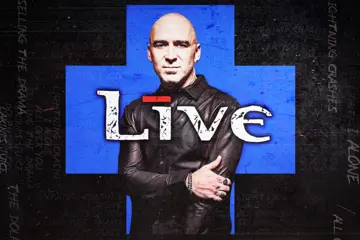Music tends to bring out the nerds. For every hundred people that like bopping along in the car, there’s someone toiling away late at night studying the ARIA Charts or alphabetising their vinyl collection. We know this because many of them work here at The Music.
Across the other side of the world, Chris Dalla Riva has turned that love of data into a career, with his acclaimed blog Can’t Get Much Higher opening the door to becoming a published author. His first book, Uncharted Territory: What Numbers Tell Us About The Biggest Hit Songs and Ourselves, hits shelves this month and reveals the trends and quirks behind the evolution of contemporary music. The book takes us through the biggest trends in music from 1958 to the present day, using data to uncover things we never knew about the zeitgeist behind the hits we remember.
“Years ago, I decided that I was going to try to listen to every number one hit,” explained Dalla Riva. “Initially there was there was no plan [for a book]. It was just this idea that I'm going to listen to these songs. I roped a friend into doing it with me, and we rated the songs out of 10 every day, but started to notice trends.
“The initial trend that I was interested in was that in the late fifties and early sixties in the US, there were all these songs, number one hits, about teenagers dying tragically. Typically, in car crashes. And I thought, ‘That does not sound like a topic for a popular song?’ And it's not one or two songs. There was a literal tradition of songs where all the plots were all loosely the same: two teenagers in love, there's some tragic accident, one of them dies.”
Don't miss a beat with our FREE daily newsletter
Dalla Riva started writing, added some songs to the end of the “chapter” noting the best and worst of the trend and it started to get noticed. Before long, he had the genesis of a book that would ultimately become Uncharted Territory.
A musician first, Dalla Riva initially started on his quest to listen to every number one single as a way to assist his musical career, figuring that the epic listening quest would make him a better songwriter.
After realising his research was turning into a book project, he went looking for interest in someone to back the idea, but it was suggested to him by another author that he publish some articles in the media to attract the attention of a publisher. He spent a few years writing articles for various publications, and when one went viral, he turned to Substack, starting his blog and newsletter.
As with many writers, Dalla Riva still holds down a day job, working with indie music streaming platform Audiomack, juggling his writing, music and professional life in a delicate balance.
“The ultimate motivating force for me writing about music or working in music is that from a young age, I was drawn to learn how to play and learn how to create things. That's still, for me, the motivating factor— I’m constantly drawn to writing about certain songs and certain artists.
“At the end of the day, what pays the rent in Hoboken, New Jersey, for Chris Dalla Riva, though, is his job at Audiomack. I work for a music streaming service. I work with data and personalisation, which is great. The data, writing and music all live in concert.”
Quizzed on trends, Dalla Riva says that while time passes and things never quite come back around the same way twice, there are sometimes nods to the past in the trends of today. Asked whether we might see a resurgence in songs about teenage tragedy, Dalla Riva said:
“This style of hip-hop that was popular like emo rap or Soundcloud rap- artists like Juice WRLD, early Post Malone. There was a sadness to that music, and there were other pop stars that came along, like Billie Eilish, where there was just a somberness to the music. Even though it wasn't specifically about teenage car crashes, it had that sombre vibe. I don't think things necessarily come back exactly, but I’m not sure if there’s a broadly cyclical pattern to popular music.
“Some things come and go. Country music, I think, is a good example in the U.S. Every couple of decades, country music returns, and there’s a cyclicalness to these patterns. But what I find typically is like most trends don't begin on one day and end on another day. They slowly rise up, and then they slowly fade away. And usually there are parts of those trends that persist into the future, but it's not like you’ll see the exact same thing repeated.”
Dalla Riva said that the biggest shift he observed from listening to every #1 song was the rise of hip-hop.
“I think from our perspective today, this doesn't seem shocking, but the rise of hip-hop in the 1990s was easily the biggest shift. In 1990, when hip-hop really crossed over in the U.S, most popular songs were broadly similar in structure even if the genre was different.
“There was a chord progression, there was a melody, there were lyrics. If something was popular, it's probably something you could whistle in the shower. And suddenly there is this dramatic shift where hip-hop is more focused on, very broadly again, rhythm and lyricism. To the point where you're not going to hum the melody of Lose Yourself by Eminem. This is like a dramatic shift in how we think about music we compose.”
He adds, “If you compare, again, Lose Yourself to something that was in like a Broadway show in the 1940s or 50s or even something by the Beatles or Phil Collins, it's a dramatic shift in how we think about music, how we think about melody. Hip-hop is so pervasive now that it doesn't seem like it's a crazy shift. But I think if you grew up in the period before hip-hop was very popular, I could see it being very confusing when it first came around.”
When asked to predict where music is heading, Dalla Riva also has some predictions.
“Speaking of hip-hop, some people talk about the decline of the genre and popularity, which I think there is a little bit of truth to. It's also not a dig at hip hop. It's been the most dominant musical force for the last 30 years, so it's a pretty good run. How long was rock music the dominant cultural force for? I think in the last decade, we've really seen Latin music cross over around the world.
“You have artists like Bad Bunny who are global superstars. I really think the next big crossover (and it's happened a little bit already) is going to be African artists crossing over to the rest of the world. Rema collaborated with Selena Gomez on Calm Down, which was pretty popular. Some other artists like Burna Boy have crossed over a little bit, but I think you're really gonna see Afrobeat music or music from Africa crossing over in the next decade in the same way Latin music has over the last.”
So, has writing the book and completing his journey through the world’s #1 songs achieved the original goal of making Dalla Riva a better songwriter? He says he still likes an organic approach to songwriting, but that his research has definitely given him pause to think during his creative process.
“I will say that sometimes I do come across a trend, and I sometimes think to myself that I could write into this trend and go along with whatever's going on, or I could write against it and have a song stand out a little bit more. I think a good example of this is the first thing I ever was somewhat known for online was an article about how there were fewer key changes in popular songs, and this sparked a huge debate on Twitter.
“Honestly, the whole thing was very strange for me. But I do think about this when I'm writing songs sometimes. I'm like, ‘Oh, should I try to put a key change in this song?’ And on one of the last two or three songs I put out, I put a key change in the song purely because I noticed this pattern, and it sort of became a thing for me. I think it made the song a little bit more interesting.”
“I'm not sitting down with a calculator to write songs, or at least I try not to. But I'm definitely pro-key change.”
Chris Dalla Riva’s Uncharted Territory: What Numbers Tell Us About The Biggest Hit Songs and Ourselves is out on November 13. Pre-order now.
















